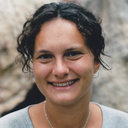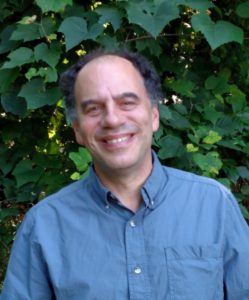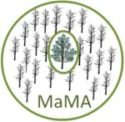MaMA was developed and is directed by both Jonathan Rosenthal (Director, Ecological Research Institute) and Dr. Radka Wildova (Senior Scientist, Ecological Research Institute). Both are widely recognized experts on invasive species, and have played major roles in outreach, research, policy, and management initiatives. Both are among the co-authors of the authoritative publication “Nonnative forest insects and pathogens in the United States: Impacts and policy options” published in Ecological Applications in 2016. They both are also part of the team that developed the high-profile TreeSmart Trade initiative aimed at preventing importation of future forest pests. Together, Rosenthal and Wildova chaired Odum Conference 2009: “Understanding and managing biological invasions as dynamic processes: Integrating information across space and time” which aimed at fostering collaboration between researchers and resource managers.
They were awarded the prestigious Loewy-Mohonk Preserve Fellowship in 2015 to conduct their project “Indirect effects of invasive forest pests: discerning patterns and processes to inform conservation strategies”. That project examined the effects of invasive forest pests not only on their host ash and hemlock trees, but also on the ecosystems in which they occur. Like much of the work they do, it took advantage of their expertise with not only forest pests, but also native and invasive plants. For example, their recent projects have included designing and analyzing citizen-science invasive plant surveys for the Lower Hudson Partnership for Regional Invasive Species Management, performing a biological inventory for the Edmund Niles Huyck Preserve and Biological Research Station (including assessment of invasive species threats to its forest health), and developing hemlock conservation recommendations for the the Catskill Regional Invasive Species Partnership. Rosenthal and Wildova have also team taught a field dendrology course (i.e., “all about trees”) at SUNY Ulster and were faculty members of the Citizen Science program at Bard College.
 Dr. Wildova earned all of her degrees (B.A. in Biology, M.S. in Biology and Ph.D. in Botany) at Charles University in Prague. She completed a postdoctoral fellowship on ecosystem impacts, population ecology and hybridization of native and invasive cattails under plant ecologist Dr. Deborah Goldberg at the University of Michigan’s Dept. of Ecology and Evolutionary Biology. She then completed a second postdoctoral fellowship at the Cary Institute of Ecosystem Studies under the pre-eminent forest ecologist Dr. Charles Canham. In that role, she collaborated on developing a model of the future spread and effects of four invasive forest pests, including EAB, in various climate scenarios. To accomplish this, she drew upon her deep knowledge of the pests as well as their host trees, including ash. Dr. Wildova served as the seasonal Scientist-in-Residence at Huyck Biological Research Station & Preserve, where much of her focus was on public outreach. She also was awarded the Huyck Research Grant for her original research on the effects of the invasive Viburnum Leaf Beetle on native viburnums. Dr. Wildova has over twenty peer-reviewed scientific publications. She has been with ERI since its inception and has also taught as an adjunct assistant professor in biology at Union College.
Dr. Wildova earned all of her degrees (B.A. in Biology, M.S. in Biology and Ph.D. in Botany) at Charles University in Prague. She completed a postdoctoral fellowship on ecosystem impacts, population ecology and hybridization of native and invasive cattails under plant ecologist Dr. Deborah Goldberg at the University of Michigan’s Dept. of Ecology and Evolutionary Biology. She then completed a second postdoctoral fellowship at the Cary Institute of Ecosystem Studies under the pre-eminent forest ecologist Dr. Charles Canham. In that role, she collaborated on developing a model of the future spread and effects of four invasive forest pests, including EAB, in various climate scenarios. To accomplish this, she drew upon her deep knowledge of the pests as well as their host trees, including ash. Dr. Wildova served as the seasonal Scientist-in-Residence at Huyck Biological Research Station & Preserve, where much of her focus was on public outreach. She also was awarded the Huyck Research Grant for her original research on the effects of the invasive Viburnum Leaf Beetle on native viburnums. Dr. Wildova has over twenty peer-reviewed scientific publications. She has been with ERI since its inception and has also taught as an adjunct assistant professor in biology at Union College.
 Rosenthal earned a B.A. in Biology at Cornell University and an M.S. in Zoology at the University of Massachusetts, Amherst. He is ABD in the PhD program at the University of Michigan’s Department of Ecology and Evolutionary Biology, where his research focused on plant-insect interactions and ecosystem effects of invasive species. While there, he taught classes in both botany and ecological methods. After relocating back East to help his family with some health issues, he initiated and oversaw the Tritrophic Implications of Plant Invasions (TIPI) project at Vassar College’s ecological preserve, where he was a visiting scholar in the Biology Department and an adjunct assistant professor in the Environmental Studies program. Rosenthal has authored peer-reviewed publications on plant community ecology, plant responses to herbivory, and clonal plant epigenetics. He has also edited books on invertebrate identification for the American Museum of Natural History. His outreach and education experience has included, among many other things, designing and implementing numerous environmental education programs, designing and teaching innovative science courses for New York City schools, and supervising a statewide citizen-science project for the Audubon Society of New Hampshire. From 2014-2017, he served on the Steering Committee of the Lower Hudson Partnership for Regional Invasive Species Management. He has been with ERI since its inception and has been especially active in public outreach for EAB management and ash conservation since 2014.
Rosenthal earned a B.A. in Biology at Cornell University and an M.S. in Zoology at the University of Massachusetts, Amherst. He is ABD in the PhD program at the University of Michigan’s Department of Ecology and Evolutionary Biology, where his research focused on plant-insect interactions and ecosystem effects of invasive species. While there, he taught classes in both botany and ecological methods. After relocating back East to help his family with some health issues, he initiated and oversaw the Tritrophic Implications of Plant Invasions (TIPI) project at Vassar College’s ecological preserve, where he was a visiting scholar in the Biology Department and an adjunct assistant professor in the Environmental Studies program. Rosenthal has authored peer-reviewed publications on plant community ecology, plant responses to herbivory, and clonal plant epigenetics. He has also edited books on invertebrate identification for the American Museum of Natural History. His outreach and education experience has included, among many other things, designing and implementing numerous environmental education programs, designing and teaching innovative science courses for New York City schools, and supervising a statewide citizen-science project for the Audubon Society of New Hampshire. From 2014-2017, he served on the Steering Committee of the Lower Hudson Partnership for Regional Invasive Species Management. He has been with ERI since its inception and has been especially active in public outreach for EAB management and ash conservation since 2014.

